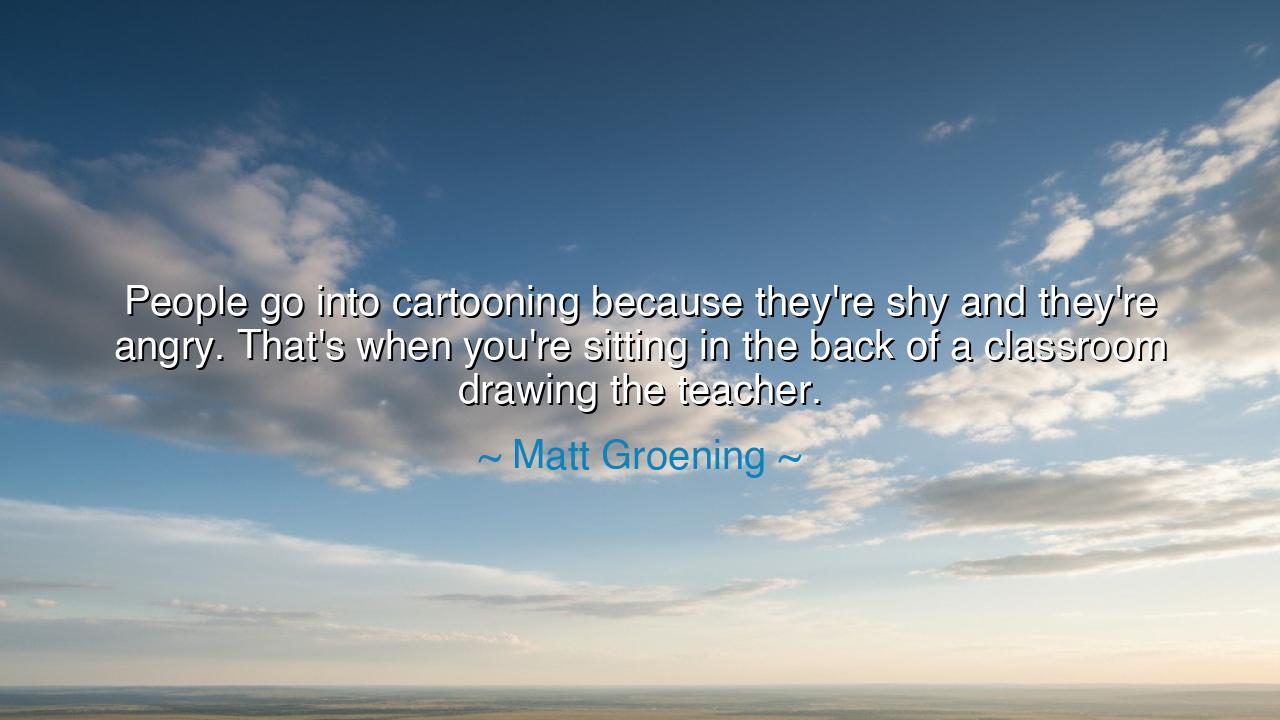
People go into cartooning because they're shy and they're angry.
People go into cartooning because they're shy and they're angry. That's when you're sitting in the back of a classroom drawing the teacher.






“People go into cartooning because they're shy and they're angry. That's when you're sitting in the back of a classroom drawing the teacher.” Thus spoke Matt Groening, creator of The Simpsons, whose words reveal a truth that is at once humorous and profound. In these words, he unmasks the origin of much art: the hidden fusion of shyness and anger, the silent rebellion of those who cannot shout with their voices but who shout instead with their pens. It is in the margins of notebooks, in the secret sketches drawn while the world looks away, that an artist often first finds their voice.
The meaning of this declaration rests in the paradox of creation. The shy child sits quietly, unseen, afraid perhaps of ridicule or misunderstanding. Yet beneath that silence, a storm brews—a storm of anger, not always destructive, but a fierce energy born of frustration, boredom, or the hunger for expression. When the child sketches the teacher in caricature at the back of the classroom, it is not merely mischief; it is the earliest act of transforming inner turmoil into art. What others see as doodles are in truth the first sparks of creativity, rebellion tempered by imagination.
History offers us many examples of this. Consider James Thurber, the famed cartoonist and humorist, who, nearly blind in one eye, struggled in school but found solace in sketches that transformed his frustrations into laughter. Or Charles Schulz, the creator of Peanuts, who as a boy was quiet, introverted, often overlooked, yet found in his characters a way to speak with the whole world. Their work began not with acclaim, but in those hidden places where shy children draw instead of speaking, where anger finds release not in violence but in artful exaggeration of life’s absurdities.
The origin of Groening’s words lies in his own youth, where his irreverent wit and sharp eye for the ridiculous were born. He too was once the quiet student sketching from the shadows, making sense of authority and absurdity through lines and humor. In his art, the teacher became a symbol of every institution that bored or oppressed, and drawing became his way of resisting without speaking—of laughing, even while he was powerless to change the rules of the classroom. From such beginnings grew The Simpsons, a satire that has skewered power, society, and culture for decades.
There is heroism in this path, though it wears the mask of humor. For to transform shyness into voice, and anger into laughter, is to refuse despair. Many who feel small, unheard, or frustrated may collapse into silence or bitterness. But the cartoonist takes these same burdens and transmutes them into joy, into critique, into a mirror that shows society its own absurdities. The child in the back of the classroom may feel powerless, but with pen in hand, they wield a subtle power—the power of truth disguised in comedy.
The lesson for us is this: never despise the doodles, the quiet rebellions, the small acts of creativity that arise from frustration. They may be the seeds of greatness. To those who are shy, know that your silence does not mean weakness; it may be the soil of deep perception. To those who are angry, know that your fire can destroy, but it can also illuminate, sharpen, and give birth to art. Combine the two—shyness to observe and anger to energize—and you may discover your truest expression.
Therefore, dear listener, take Groening’s words to heart. When life places you in the back row, when you feel unseen or restless, take up your pen, your instrument, your craft. Transform your frustration into creation, your silence into laughter, your rebellion into art. For the sketch of a teacher in a schoolroom may one day grow into a work that makes the whole world listen, laugh, and awaken. This is the gift of the artist: to turn private storms into public light.






AAdministratorAdministrator
Welcome, honored guests. Please leave a comment, we will respond soon